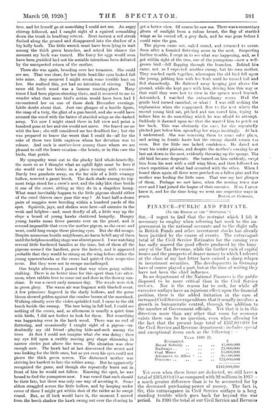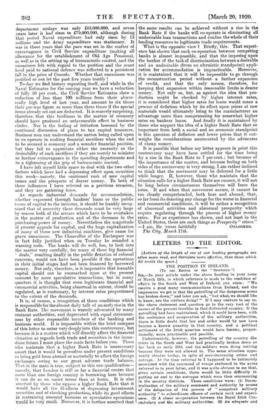FINANCE—PUBLIC AND PRIVATE.
LTo THE EDITOR OF THE " SPECTATOR."i SIR,—I regret to find that the restraint which I felt ii necessary to employ when referring last week to the im• provement in the national accounts and to the slight rally in British Funds and other investment stocks has already been justified by the course of events. The extravagant total of the Civil Service Estimates for the coming year has sadly marred the good effects produced by the buoy ancy of the Tax Revenue, while the further rush of capital issues and the prospects of dearer money to which I referred at the close .-of my last letter have caused a sharp relapse in investment securities. The developments in Germany have of course played a part, but at the time of writing they have not been the chief influence.
In no department of the National Finances is the public disposed to be more critical than in the Civil Service sect:on. Nor is the reason far to seek, for while all excessive outlays have an injurious effect upon the financial position. there is the added irritation in the case of increased Civil Service expenditure that it usually involves a growth in bureaucratic control, through the addition to the number of Government officials. Yet that it is in this direction more than any other that room for economy exists there can be no question, even when allowing for the fact that the present huge total of £557,03).030 for the Civil Service and Revenue departments includes special and exceptional items such as the following :--- YEAR 1920. 21.
- Estimated.
Bread Subsidy ..
• • 45,000,000
Railways ..
23,000,000
Coal Mines ..
15,000,000 Advances to Allies •
36,000,000 Pensions • • .. 123,000,000
£242,000,000
Yet even when these items are deducted, we still have a total of £315,009,03) as compared with 92 millions in 1913- a much greater difference than is to be accounted for by the decreased purchasing-power of money. The fact is, Sir, this extravagance in Civil Service outlays is a long- standing trouble which goes back far beyond the war period. In 1906 the total of our Civil Service and Revenue department outlays was only £48,000,000, and seven years later it had risen to £79,000,000, although during that period Naval expenditure had only risen by 1.3 millions and the Army expenditure was stationary. It was in those years that the pace was set in the matter of extravagance in Civil Service expenditure (making all allowance for the establishment of Old Age Pensions), as well as in the setting up of bureaucratic control, and the uneasiness felt with regard to the position and the scant heed paid to national defence was reflected in a persistent fall in the price of Consols. Whether that uneasiness was justified or not let the past five years testify !
To-day we find history repeating itself, and while in the Naval Estimates for the coming year we have a reduction of fully 50 per cent., the Civil Service Estimates show a reduction of less than 100 millions from their abnor- mally high level of last year, and amount to six times their pm-war figure. or more than three times if the special items already set out are deducted. It is scarcely surprising, therefore, that this tardiness in the matter of economy should have produced an unfavourable effect in business circles. Nor is the feeling of irritation lessened by the continued discussion of plans to tax capital resources. Business men can understand the nation being called upon to co operate in making financial sacrifices when the end to be secured is economy and a sounder financial position, but they fail to appreciate either the necessity or the desirability of such sacrifices if they are merely to minister to further extravagance in the spending departments and to a tightening of the grip of bureaucratic control.
I have left myself little space to deal with the two other factors which have had a depressing effect upon securities this week—namely, the continued rush of new capital issues and the prospects of dearer money. To both of these influences I have referred on a previous occasion, and they are gathering force. As regards industrial demands for accommodation, whether expressed through bankers' loans or the public issues of capital to the investor, it should be- frankly recog- nized that of necessity these demands must be very large by reason both of the arrears which have to be overtaken in the matter of production and of the decrease in the purchasing-power of money. Nevertheless the magnitude of present appeals for capital, and the huge capitalization of many of these new industrial combines, give cause for grave uneasiness. The Chancellor of the Exchequer was in fact fully justified when on Tuesday he sounded a warning note. The banks will do well, too, to look into the matter very carefully, for many of these big financial deals," resulting finally in the public flotation of colossal concerns, would not have been possible if the operations in their initial stages had not been financed by borrowed money. Not only, therefore, is it imperative that loanable capital should not be encroached upon at the present moment by mere speculative transactions, but in many quarters it is thought that even legitimate financial and commercial activities, being abnormal in extent, should be regulated, as is customary, by interest rates proportioned to the extent of the demands.
It is, of course, a recognition of these conditions which is responsible for the almost daily talk of an early rise in the Bank Rate. The movement is warmly advocated by many eminent authorities, and deprecated with equal strenuous- ness by other responsible members of the banking and business world. It is impossible within the brief compass of this letter to enter very deeply into this controversy, but because it is a matter which will directly affect the financial situation as regards both trade and securities in the imme- diate future I must place the main facts before you. Those who maintain that a higher Bank Rate is unnecessary assert that it would be powerless under present conditions to bring gold from abroad or materially to affect the foreign exchanges owing to our great adverse trade balance. That in the main is true, subject to this one qualification— namely, that London is still so far a financial centre that more than one foreign country is borrowing here because it can do so on easier terms than at home. It is also assorted by those who oppose a higher Bank Rate that it would have all the ill-effects of depressing investment securities and of checking production, while its good effects in restraining unsound business or speculative operations would be very small. Moreover, it is further asserted that the same results can be achieved without a rise in the Bank Rate if the banks will co-operate in eliminating all undesirable loan transactions and confine the whole of their lending resources-to legitimate trade requirements. What is the opposite view ? Briefly, this. That experi- ence has shown that such co-operation between competing banks is almost impossible, and that the imposing upon the banker of the task of discrimination between a desirable and an undesirable (from an altruistic standpoint) appli- cation for accommodation is impracticable. Moreover, it is maintained that it will be impossible to go through the reconstruction period without a further expansion of credit, and that the only means, therefore, for keeping that expansion within reasonable limits is dearer money. Not only so, but, as against the idea that pro- duction might be checked by higher interest rates, it is considered that higher rates for loans would mean a process of deflation which by its effect upon prices of raw materials would ultimately bring to the manufacturer an advantage more than compensating for somewhat higher rates on bankers loans. And finally it is maintained by those who support the idea of a higher Bank Rate that so important from both a social and an economic standpoint is this question of deflation and lower prices that it out- weighs the considerations enumerated by the advocates of cheap money.
It is possible that before my letter appears in print this controversy may have been settled for the time being by a rise in the Bank Rate to 7 per cent.; but because of the importance of the matter, and because feeling on both sides of the controversy is very strong, I am rather inclined to think that the movement may be deferred for a little while longer. If, however, those who maintain that the situation calls for a highei Bank Rate are correct, it will.not be long before circumstances themselves will force the issue. If and when that movement occurs, it cannot be too clearly comprehended, both here and abroad, that, so.far from its denoting any change for the worse in financial and commercial conditions, it will be rather a recognition _ of abnormal activities and abnormal prosperity which require regulating through the process of higher money rates. For as experience has shown, and not least in the United States, there are such things as Prosperity" crises." —I am, Sir, yours faithfully ONLOOKER. The City, March 17th.





































 Previous page
Previous page